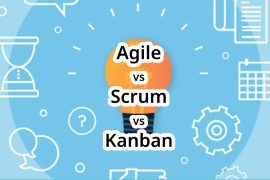According to a recent Gartner survey, 25% of IT leaders identified artificial intelligence (AI) as the technology that will change the game for their organization in 2021 [1]. In addition, 40% of small-business leaders in Capterra’s 2023 Top Technology Trends Survey mentioned AI and machine learning as valuable future technologies for their organizations.
The time is now to use AI tools for your own company, but depending on your sector, requirements, and financial situation, it can make more sense to invest in AI-as-a-Service or AIaaS. We will walk you through insights from Gartner research as well as surveys that indicate how your peers are utilizing AI services to help you decide whether AI-as-a-Service is the appropriate choice for your team.
Table of Contents
AI-as-a-Service: What is it?

The outsourcing of AI services to outside providers is known as AIaaS. This is a fantastic choice for companies looking to explore ready-to-use AI solutions at a lower initial cost and commitment level than what it would take to develop an AI solution internally. In fact, according to our 2022 Services Users Survey**, 28% of SMB executives made investments in AI services over the past 18 months.
These services cover everything from AI strategy to the design, deployment, and management of AI software. AI service providers also help with data administration, curation, cleansing, modeling, auditing, and assembly. Over half of all enterprises will have used AI service providers for implementation, consulting, or managed services by 2024, according to Gartner [1].
Here are some often provided AI services with detailed explanations:
- AI algorithms are used in natural language processing (NLP) to assist computers in comprehending spoken and written human language. NLP systems can comprehend, examine, and extract meaning from text and speech using deep learning and machine learning models.
- AI is used by machine learning (ML) systems to develop logical data models and extract insights from data. AI is used by machine learning (ML) systems to develop logical data models and extract insights from data. In order to make educated judgments and address complicated issues, these ML models are applied in business operations. Self-driving cars, product recommendation systems, and language translation systems are all built using machine learning algorithms.
- An AI service known as a virtual personal assistant (VPA) employs deep learning to have individualized dialogues with users. It responds to voice commands and carries out user instructions. With less human interaction and fewer mistakes, tasks can be automated with the aid of a digital virtual assistant.
- Robotic process automation is the application of an AI tool to carry out difficult or repetitive operations. The system is set up to manage tasks from alignment to delivery from beginning to end.
- AI is used in data analytics to find patterns, establish links, and gain new insights. The development of prediction systems and algorithms that test and confirm the application of insights in solving challenging business problems is another benefit of AI-powered data analytics. Testing automated data enables more precise decision-making.
- These services are provided by AI firms that turn AI technology into a cloud-based AIaaS solution that enables you to achieve your business objectives without making a significant initial investment. These AI software platforms are created by data scientists, analysts, and/or engineers after careful consideration of the needs and objectives of the business.
Why should I spend money on AI as a Service?
Three basic justifications exist for investing in AI-as-a-Service.
1. You need to analyze a lot of data.
For the processing and analysis of big data, sometimes referred to as high volume data assets, machine learning is helpful. By assigning labels to data and gleaning insights, it benefits businesses. These insights can then be used to guide business decisions or be presented to stakeholders.
2. You have procedures that machines can handle more effectively than people can.
A perfectly good reason to invest in AI-as-a-Service is to save your employees from the monotony and tedium of repetitive jobs. AIaaS can free up your employees to work on duties that are more valuable, such as sending out bulk emails, entering data, or providing customer service.
3. You would gain from trend forecasts or predictions.
You will profit from investing in AIaaS for its predictive analytics capabilities if your sector demands you to keep an eye on trends—or, better yet, stay one step ahead of them. We’ll go into more detail about some of the industries that benefit from trend forecasting and prediction below.
What benefits and drawbacks does AI-as-a-Service offer?
Here are some advantages and disadvantages to consider before investing in an AI startup if your company is in a sector that could benefit from AI-as-a-Service.
Benefits of AI as a Service
- Your needs are catered for by AI solutions: AI as a Service (AIaaS) offers you the knowledge and experience of trained engineers that can transform AI techniques into effective business solutions. From recognising the business challenge to adopting AI software tools, they will help you with end-to-end solutions.
- Only what you use will be charged to you. Vendors of AI services offer pre-made AI solutions to solve business issues. By doing this, you can avoid spending money on software development and research costs. Additionally, you’ll have the freedom to decide.
- Quick and simple implementation: AI services providers, particularly those who offer software solutions, typically offer quick and accurate integration into your business processes, followed by ongoing support. By doing this, you can avoid the time-consuming and error-prone internal development and implementation of AI tools.
Issues with AI as a service
- Security issues can arise. When using cloud services, you may have to compromise on privacy because sharing large amounts of data with outside suppliers puts you at risk for security lapses. It’s a good idea to enquire about the policies and procedures that possible AI service providers use for data storage, access, and transit to servers.
- You are reliant on a supplier. When you depend on a third party for information, you are at the mercy of their response time. Additionally, you won’t be able to see the procedures or AI algorithms that your provider employs to get outcomes. Consequently, you won’t get as much knowledge as you would by creating and executing your own internal solution.
- Costs over time can be very expensive. In contrast to the $4 to $100 per user, per month investment in AI platforms, 70% of SMB executives spent $50k or more on their most recent data intelligence services contract in the previous 18 months**.
Vendors of AIaas
The leading providers of AIaaS are probably not a surprise. Industry leaders including Amazon Web Services (AWS), Microsoft Azure, and Google Cloud Platform (GCP) have made AIaaS services available to numerous businesses worldwide. In addition to fully managed machine learning services, each provider also provides a variety of bots, APIs, and machine learning frameworks.
But other well-known IT companies, like Salesforce, Oracle, and SAP, are encroaching on the domain of the Big 3.
several start-ups that are concentrating on different aspects of AIaaS. Similar to other industries, it is usual for larger businesses to acquire smaller ones in order to expand their service offerings.
Conclusion
AIaaS is a rapidly expanding sector with many advantages that attract early adopters. However, due to its shortcomings, there is still much space for development.
Even if there may be setbacks in the development of AIaaS, it is expected to be just as significant as other “as a service” offerings. By removing these important services from the hands of a select few, more businesses will be able to utilize AI and ML.






